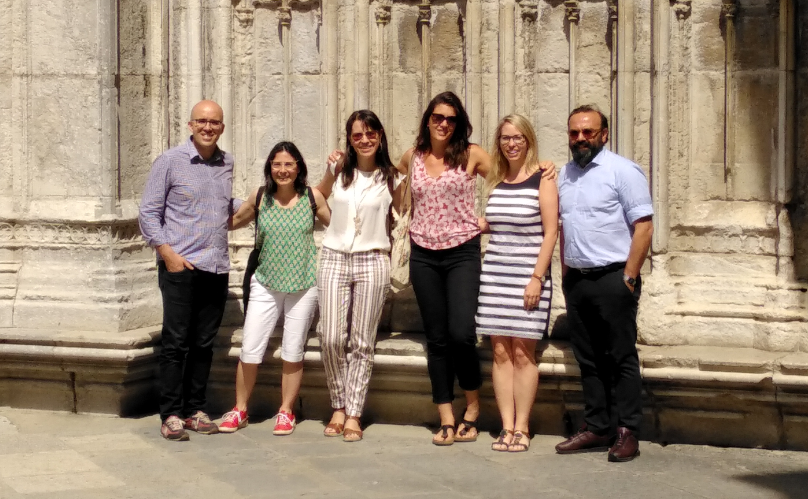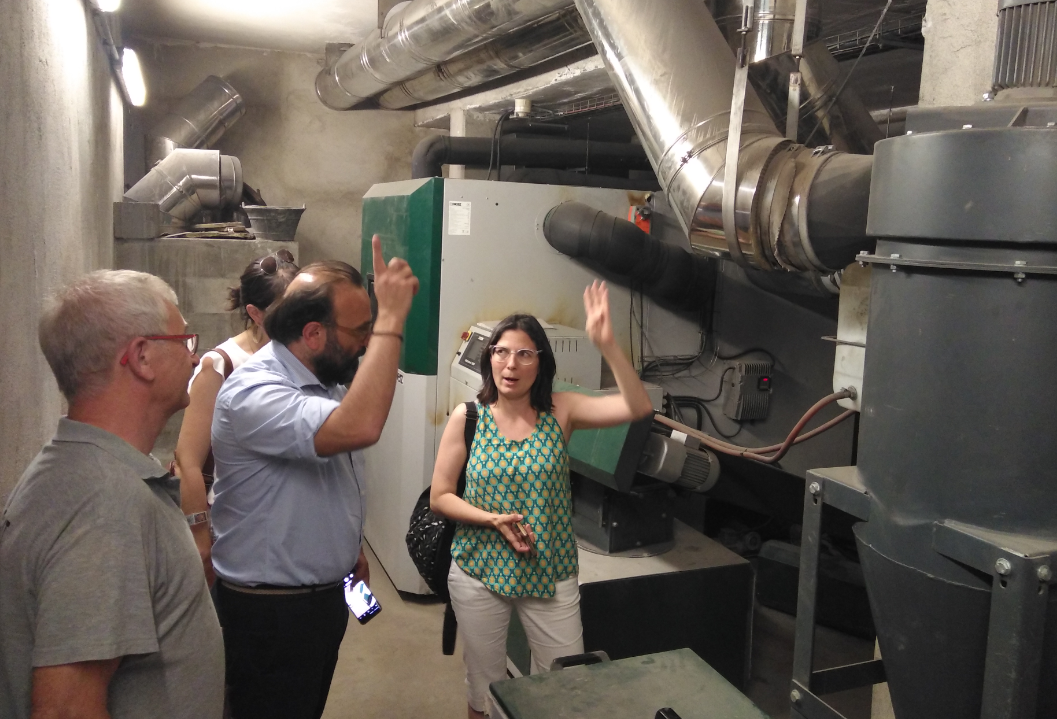The Province of Girona mentoring in PROSPECT Learning Cycle 2
Author: Anja Gahleitner (Facilitator Prospect)
The Mentor ‘Diputació de Girona (ddgi)’ in Spain is sharing its expertise on financing and implementing successful energy performance contracting (EPC) projects in street lighting and in public buildings with the Mentees ‘County Council of Avila (Spain)’, ‘Municipality of Trikala (Greece)’ and Local Development Agency ‘Pieriki Anaptixiaki (Greece)’. They participated in the 2nd Cycle of the PROSPECT Learning Programme, constituting the 3rd Group for Public Lighting. The peer learning activities will be focussed on Energy Performance Contracting (EPC). +Mentors' Corner
Step 1 & Step 2 of the PROSPECT programme are online sessions where mentor and mentees present their projects, exchange on their experience and point out their specific needs.
Mentees visited DDGI in Spain to learn about EPC for public lighting
During Step 3 of the Learning Programme, a physical meeting took place in the City of Girona on the 18th and 19th of June 2019. The main objective was to deepen the mentees’ know-how of EPC-related topics and to create an environment for dialogue and exchange on the practical implementation of street lighting refurbishment projects, the installation of biomass boilers in public buildings and EPC in general.

Image: Alberto López Casillas from the County Council of Avila (Spain), Remei Aldrich from the Provincial Council of Girona (Spain), Afroditi Koti from the Municipality of Trikala (Greece), Anna Camp from the Provincial Council of Girona (Spain), Anja Gahleitner from the OÖ Energiesparverband (Austria), Konstantinos Zapounidis from Pieriki Anaptixiaki S.A.-O.L.A. (Greece)
The Provincial Council of Girona is a local public administration that carries out certain activities and services on behalf of the government and administration of the province of Girona. In the last years, ddgi supported the municipalities in the region in mobilising sustainable energy investments through innovative financial schemes. The BEenerGi Programme has triggered over 20.33 million Euros of sustainable energy investments in Girona, mostly for street lighting and public buildings. 70 tendering processes are being carried out in an innovative new bundled tendering models. Following a presentation of these activities, their EPC concept was explained in detail and the spreadsheet they used to mobilise such investments was explained.
The presentations were followed by site visits to public buildings in which biomass boilers have been installed and to 2 street lighting installations that were refurbished using EPC (one in Sant Julià de Ramis and one in Navata, which is still being implemented).

Participants benefited from sharing internal know-how (among each other and with the mentor) as well as from external inputs provided by a MESCO (Micro Energy Service Companies) and the municipalities.
Some Quotes from the Participants:
"Before taking part in this mentoring programme, these were only theoretical financial schemes to us. It has been an opportunity to discover real based on these schemes.", Alberto López Casillas, Diputación Provincial de Ávila (Spain)
“An outstanding chance to get familiarized with the application of energy efficiency via EPCs and other funding instruments, and, more importantly, to record implemented energy efficiency technologies on public buildings and street lighting.“, Konstantinos Zapounidis, Pieriki Anaptixiaki S.A.-O.L.A. (Greece)
“Prospect is the journey that the arrival matters!”, Afroditi Koti, Municipality of Trikala (Greece)
“It has been a great opportunity to explain in detail our innovative financial scheme. The Mayors and the local MESCOs were happy to explain their experience to the mentees.”, Anna Camp, Provincial Council of Girona (Catalonia)
Replication/Transferability
The 4th and last Step of the Programme includes an online session dedicated to the assessment and evaluation of the peer learning activities.
The session took place on the 4th of September 2019. Detailed action plans were submitted by the mentees, in light of the new-acquired knowledge gained from the mentor. Conditions for success and key parameters that could affect negatively the plans were also identified, along with a benchmark survey that encapsulated all the outcomes of the learning group.
Rethinking the financing scheme:
Main impressions and understanding about the financing scheme:
It is an interesting financing scheme, because it offers the opportunity to
carry out projects in small and medium size municipalities that, otherwise can not do it
It could be valuable when working with local authorities. It offers a tool that could serve the needs of small or large villages, independent of the technical personnel they have. It is should be tested by mentees during the training.
EPC is a contractual arrangement between a client and a service provider. It has to do with maintenance, energy management and energy supply. The sources of funds could me,-ERDF. Loans, public loans, MESCO, ESCO, public budget, own resources.
Key project implementation drivers::
- It fits to municipalities with difficulties to carry out energy projects
- It is simple and replicable for most of projects
- It is compatible with some other funds or schemes (subsidies…)
- Limited payback period-easy to convince the local authorities.
- Automatisation that could be used quickly and avoiding mistakes that separated calculations could create.
- Energy and money savings for the small municipalities.
Key project implementation barriers:
- Lack of knowledge of the systems by legal stakeholders.
- It is difficult (and sometime expensive) to compile all the information about the previous stage of energy system.
- The legal framework, the difficulty to organize all these municipalities and to have good quality- accurate data.
Key steps to set up or develop the financing scheme:
- Interest of decision makers
- Knowledge of previous state of energy consumption installations
- Development of strategy to afford changes in energy consumption installations
- Decision of conduct changes according to prioritization of strategy
- Preparation of technical and economical requirements
- Implementation of changes
- Evaluation of actions and measurement of results

